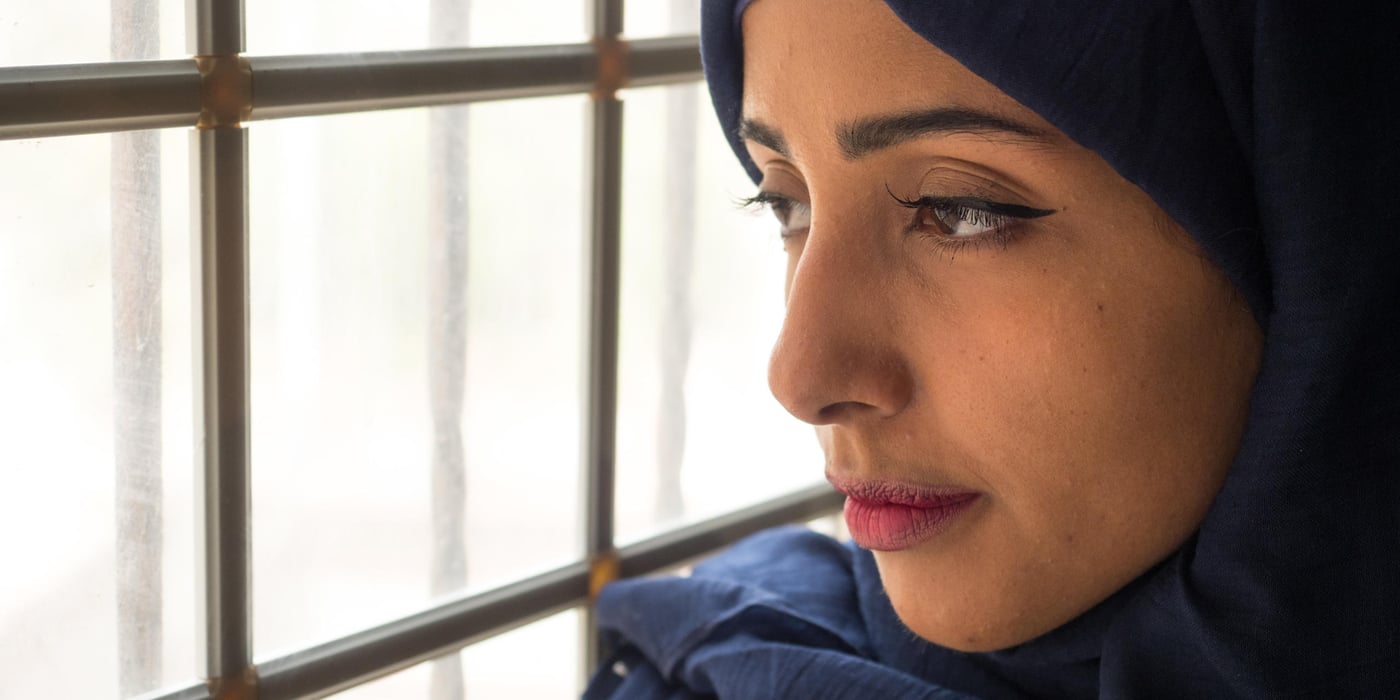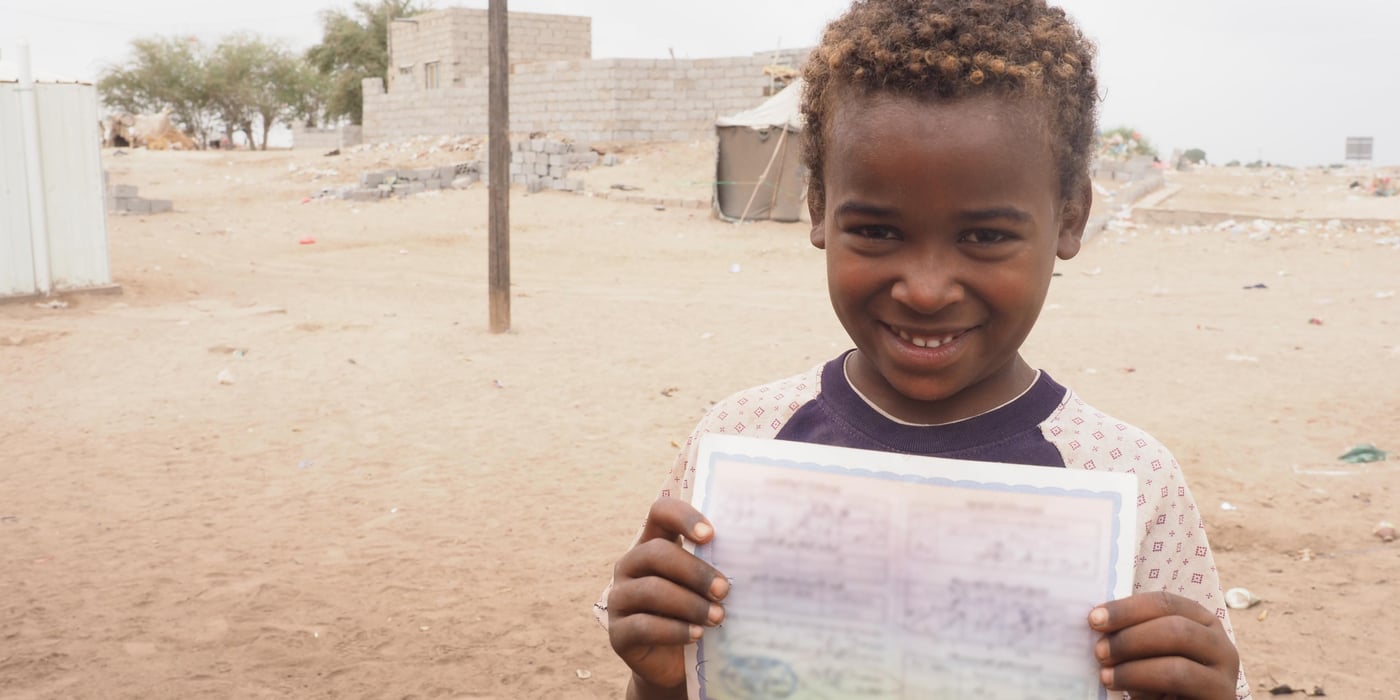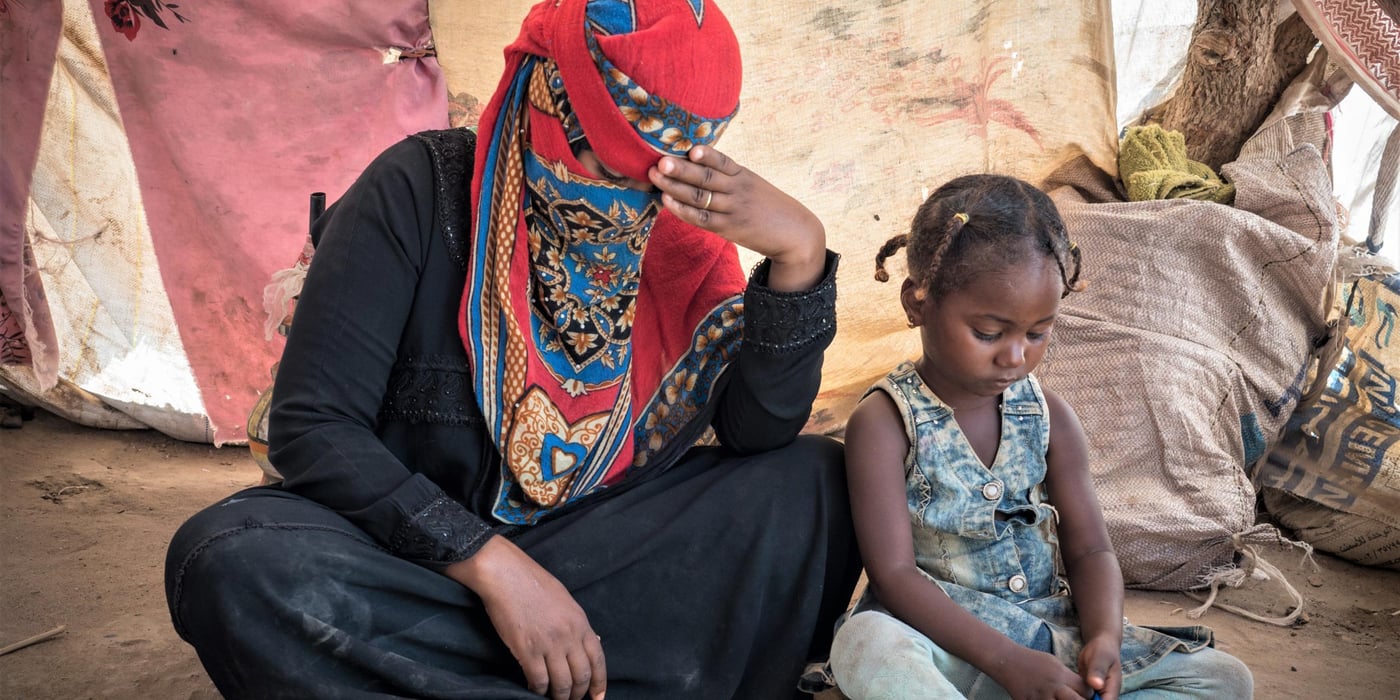

Hur är det att vara ung mamma och på flykt i Jemen?
– Det var svåra sammandrabbningar nära vårt hus. Vi kunde inte gå ut för att skaffa mat eller vatten.
Ahlam möter oss i sitt tält i Al-Garad, ett av de många läger för dem som har tvingats fly från sina hem i Jemen. Rösten brister.
– En dag gick min man till jobbet, men han kom aldrig hem igen. Flera kulor träffade hans kropp den dagen och hans själ lämnade oss.
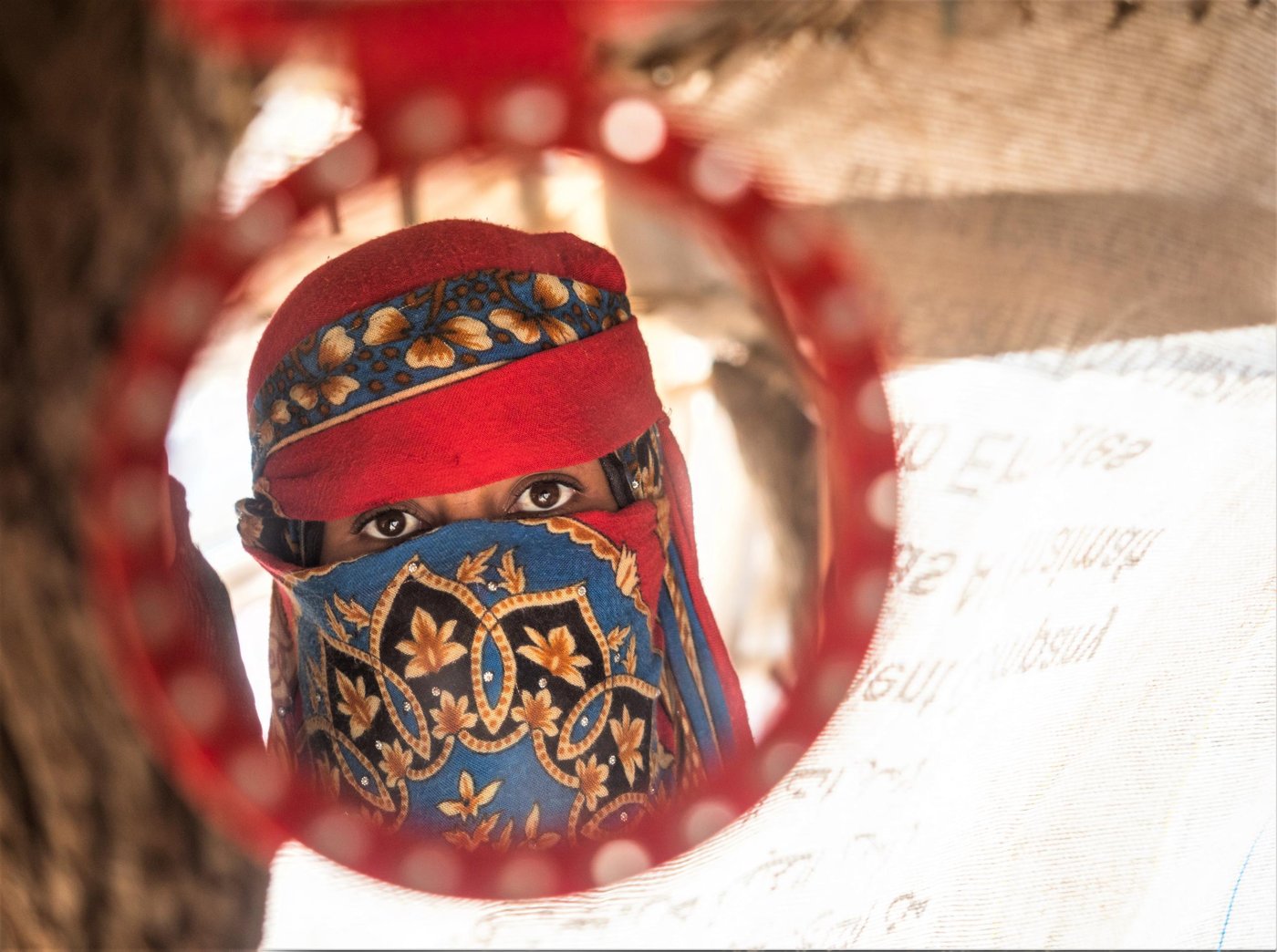
Inne i det lilla tältet kryper yngsta dottern Adyan, 4 år, upp i mammas famn.
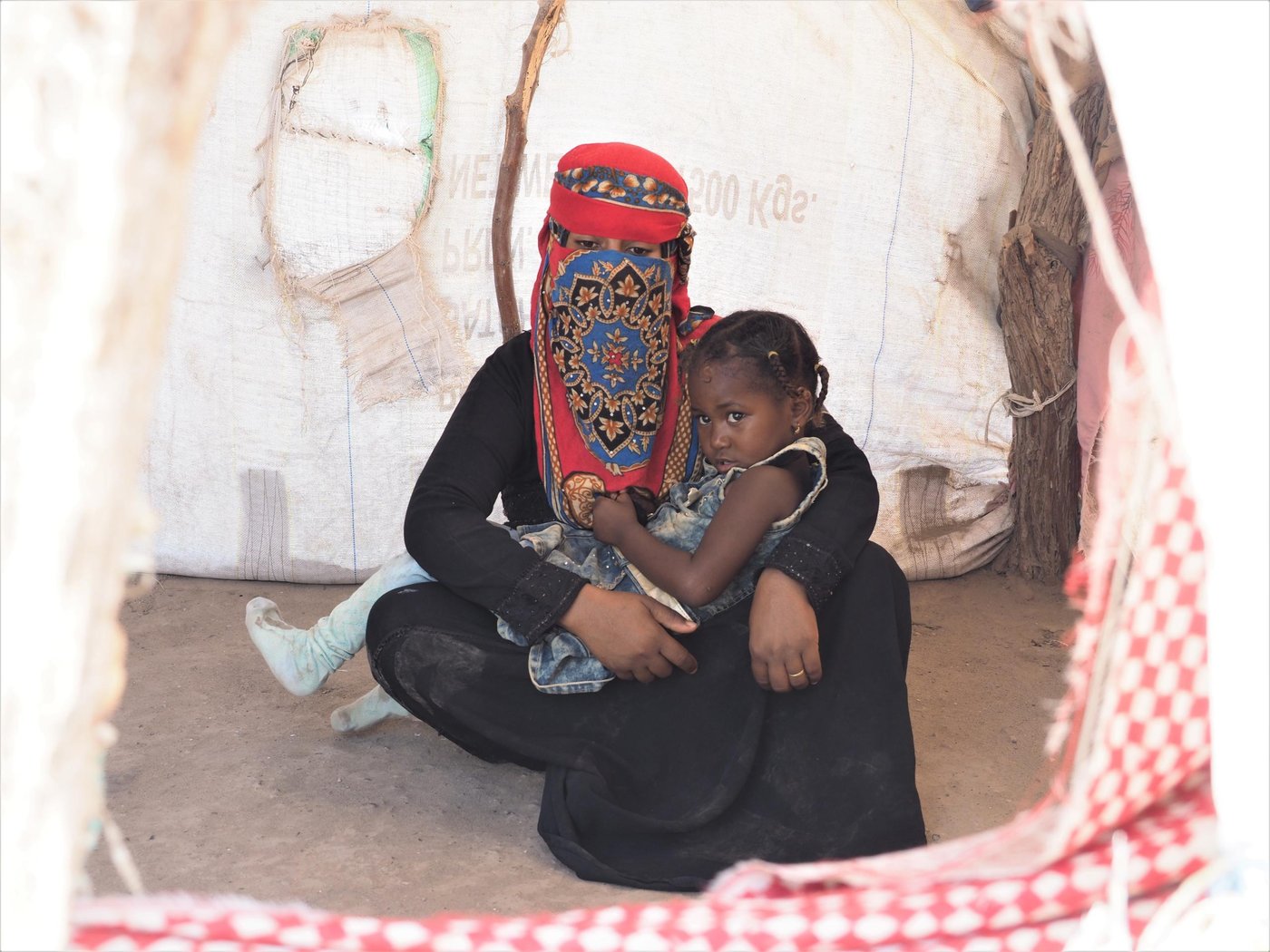
Det är nästan ett och ett halvt år sedan Ahlam tog sina fyra barn och flydde från hemstaden Taiz.
– Under flykten var vi hela tiden livrädda för att kulor och krypskyttar uppe i bergen skulle döda oss, säger hon.
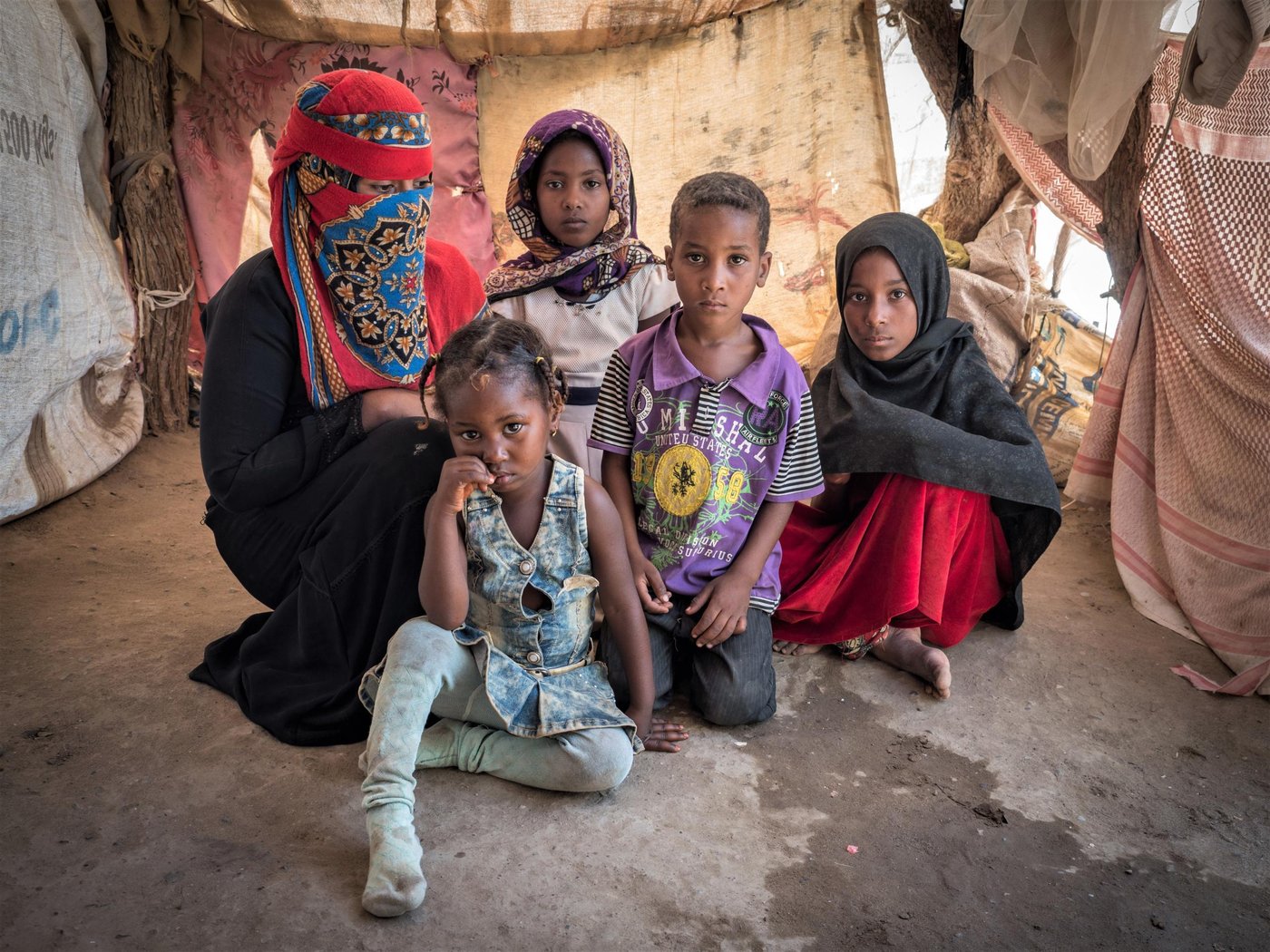
Slutligen kom de till lägret Al-Garad, som grundades 2016 och idag är hem för nästan 60 familjer på flykt. Även om NRC och FN:s livsmedelsprogram har delat ut lite mat i lägret, är det fortfarande stor matbrist och Ahlam är ofta hungrig flera dagar i sträck, för att barnen ska kunna äta.
– Jag trodde aldrig att mitt liv skulle bli så här. Att jag skulle vara ensam om att försörja mig själv och mina barn, säger hon.
Förutom att det saknas mat, finns det bara en vattentank nära lägret där invånarna kan få rent vatten. Det är alltid kö. De två äldsta döttrarna Taypa, 8 år, och Fatima, 10 år, brukar hjälpa deras mamma när hon ska hämta vatten och ved.
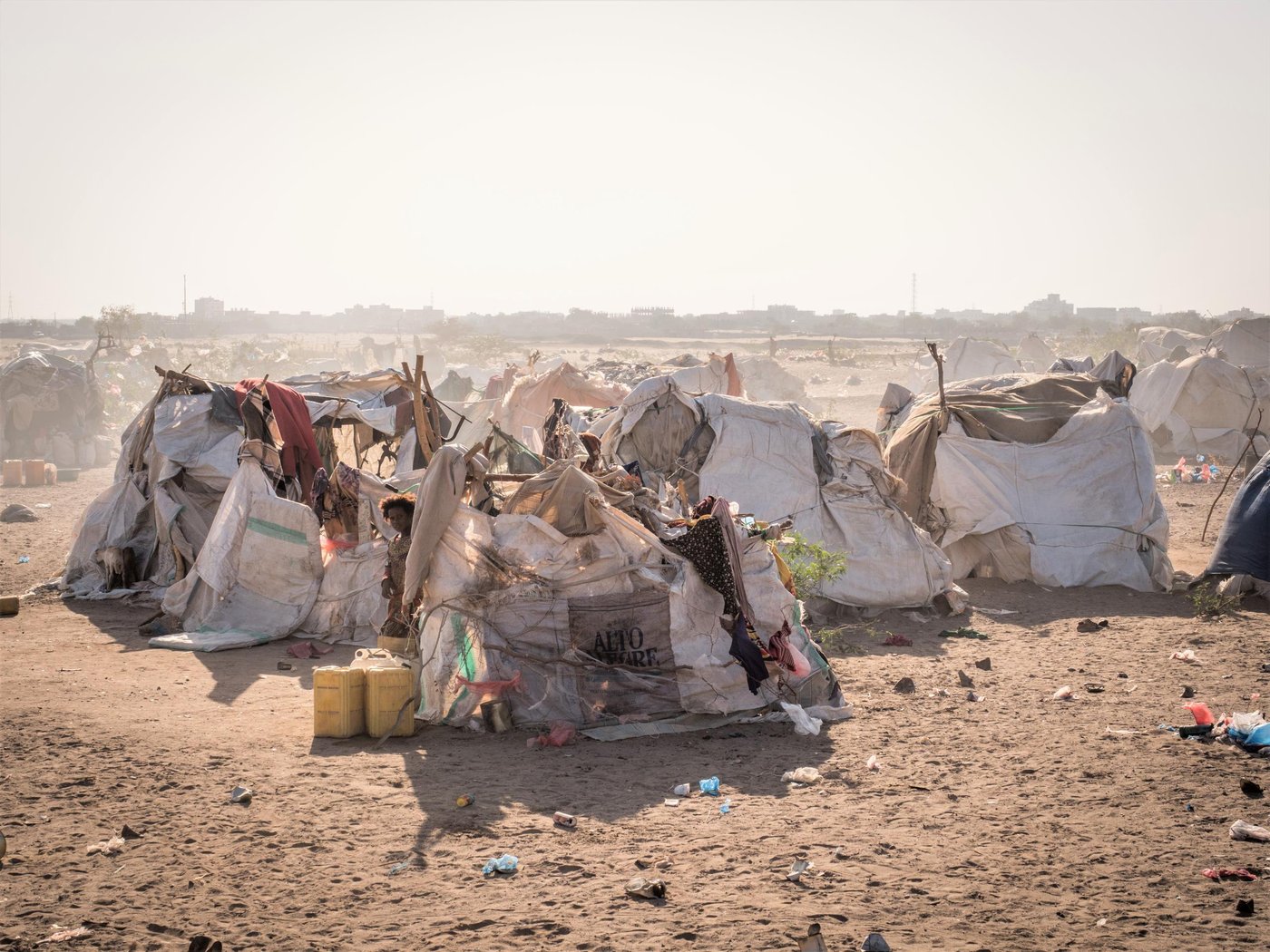
Ahlam oroar sig för sommaren. Den heta vinden får luften att dallra och det kommer att bli nästan omöjligt att vistats utomhus under den stekande solen. Livet i lägret blir ännu svårare för den unga familjen.
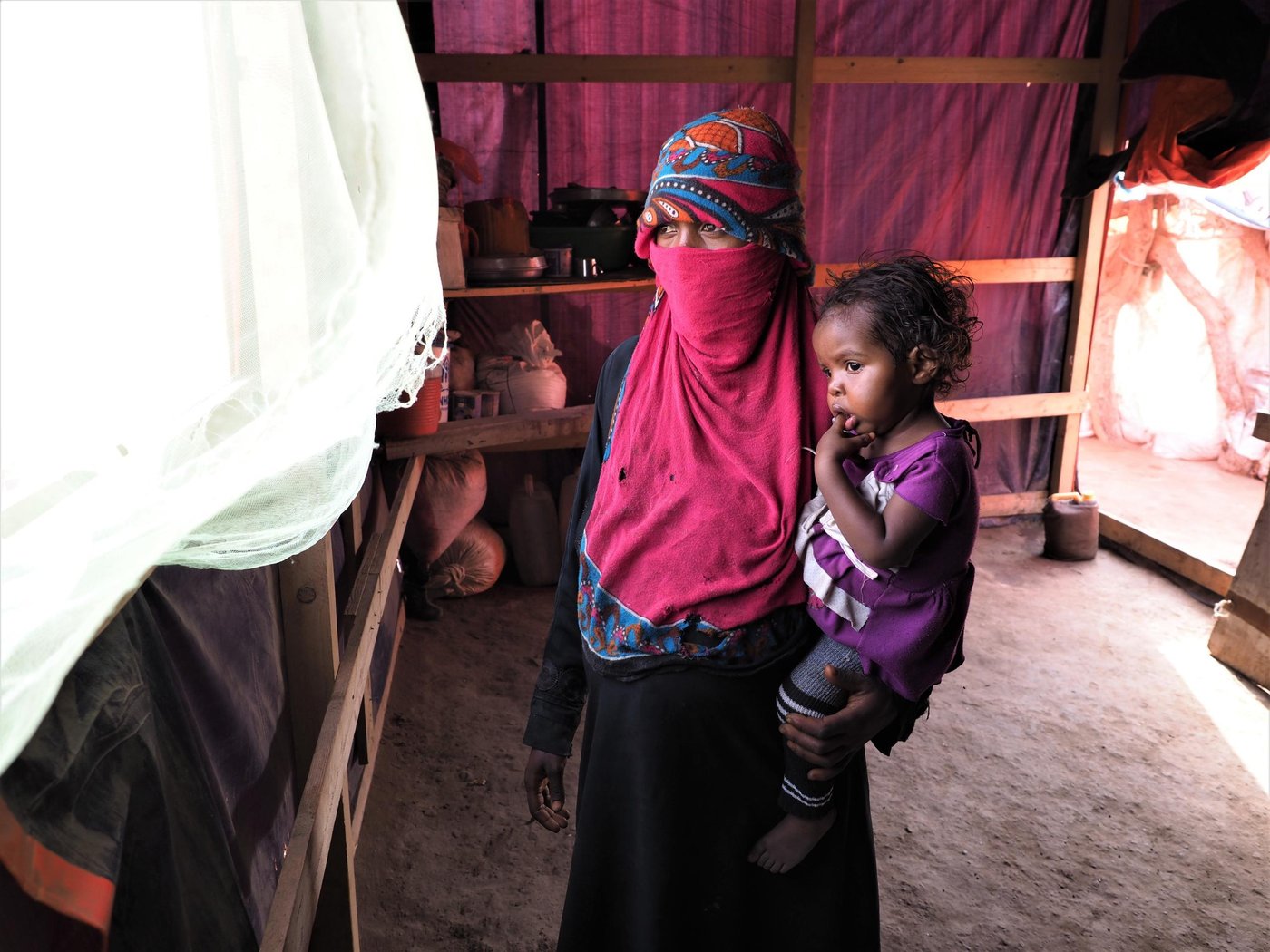
En annan mamma som är orolig för sommaren och den kommande hettan är Rana, som bor i Al-Mishqafa, ett annat läger i området. Hon är varm och yr - och gravid i åttonde månaden.
I lägret arbetar NRC bland annat med att ge människor tak över huvudet och bygga latriner. Men förhållandena är eländiga. Det är trångt och lyhört mellan tälten. Det är varmt och dammigt. Dessutom finns här insekter, ormar och skorpioner.
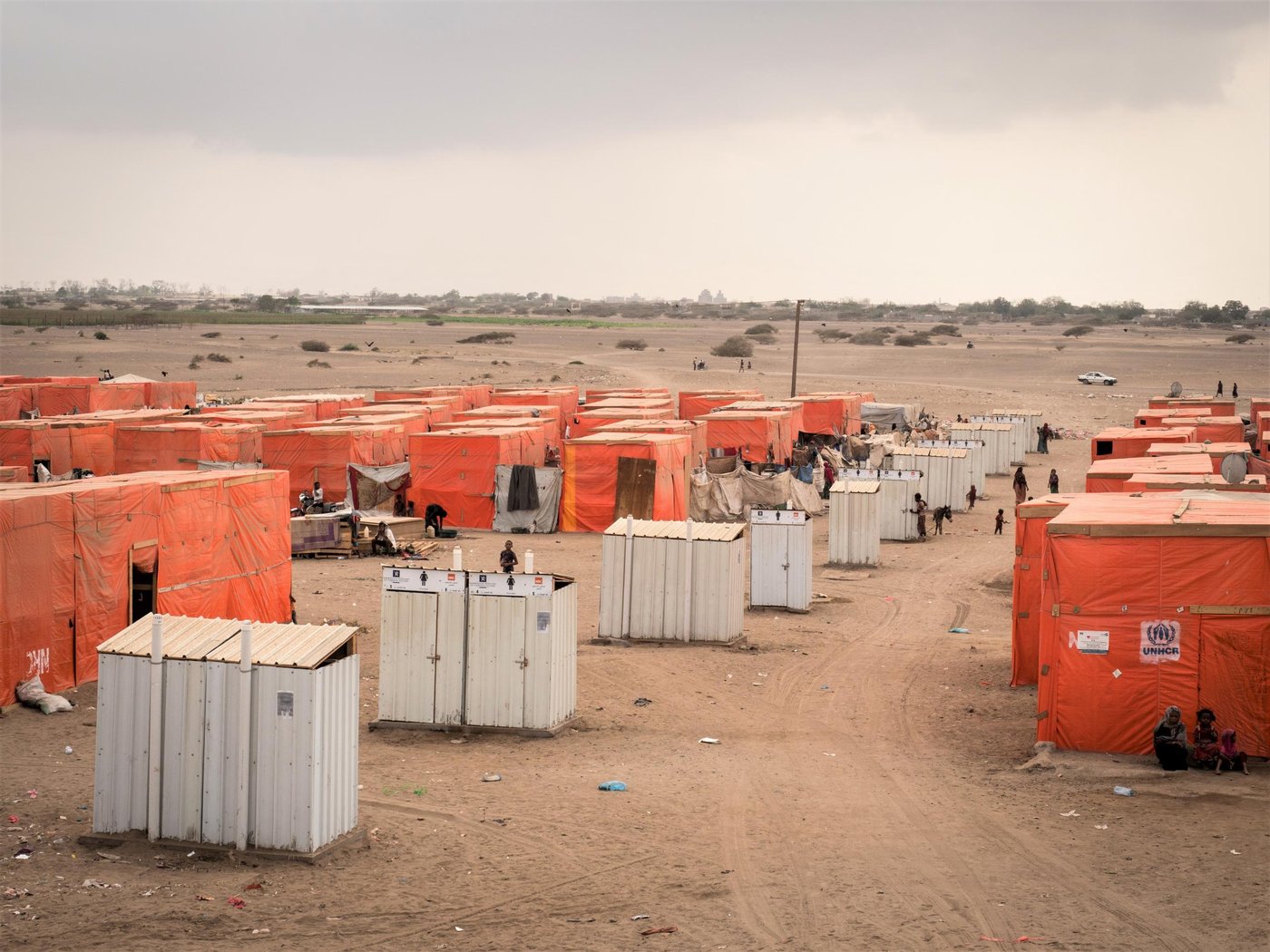
Lägret saknar det mesta.
– Vi behöver mer mat och vatten, förutom fläktar. Jag vet inte hur vi ska klara oss igenom sommaren annars, säger Rana.
Al-Mishqafa ligger i öknen. Värmen är redan extremt obehaglig.
Det är två år sedan Rana, hennes man och resten av familjen kom till lägret.
– Striderna kom allt närmare, och kulor sköts in i huset. Vi gick en vecka utan mat, eftersom vi inte kunde gå ut. Min faster blev skjuten i magen. Då flydde vi, berättar hon.
Rana är glad att hon har familjen hos sig, även om alla är upptagna med sina egna bekymmer. Dotter Hayam, som är 18 månader, kämpar med en otäck hosta och undernäring. Mannen arbetar på olika byggprojekt för att försörja den lilla familjen. En stor del av lönen går till att skaffa medicin till Hayam.
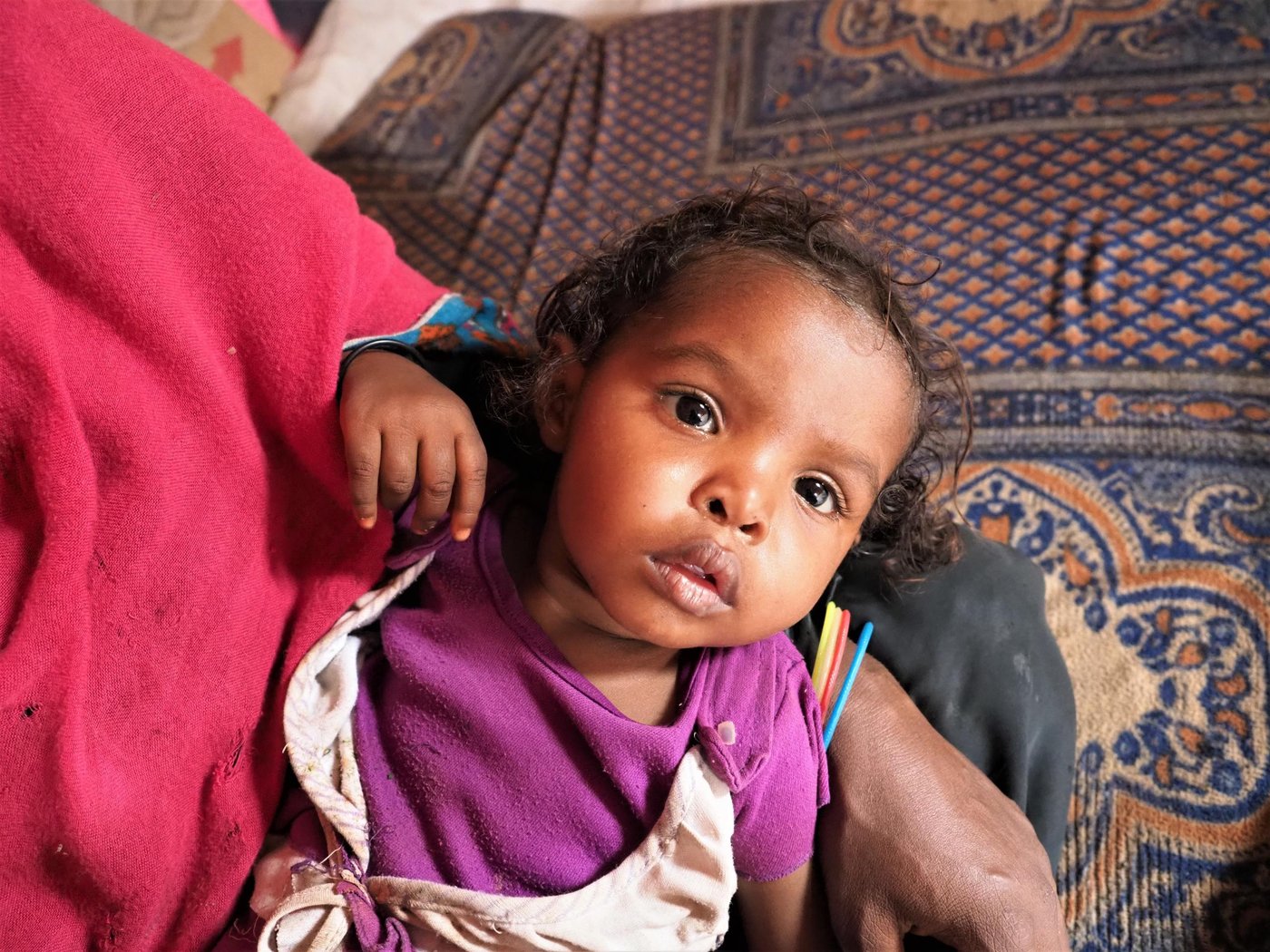
Graviditeten och värmen gör att Rana ofta är yr och hon kräks mycket. Hon oroar sig för förlossningen. Det finns inga barnmorskor eller sjuksköterskor i lägret. Inga specialister som kan hjälpa till.
Hon är på flykt och hon ska bli mamma för andra gången i krigshärjade Jemen.


![Yasin Ismail has been working for NRC for five years and believes NRC is one of the best organisation to work for. Yasin started working for NRC as an Education Assistant and is now an Education Coordinator at NRC's Aden area office.
Yasin believes education is a critical component of the work NRC does, because of its great impact on people’s lives. He recognises it as a basic human right, important to the development of children and youth to fulfill their potential, and critical to breaking the inter-generational cycle of poverty.
The impact of the conflict in Yemen has been catastrophic. Schools have been destroyed or occupied by armed groups or displaced populations, which have deprived children in some areas from accessing school for more than four years.
Children in Yemen are struggling to cope with the violence they have faced during the conflict, and continue to face imminent danger as conflict carries on and exposes them to UXOs, mines and crossfire.
Yasin believes the security situation, which results in restricted access and unpredictable funding for education, are two of the main challenges in his job. He said that affected communities need access to aid but will sometimes have challenges accessing this due to long delays at checkpoints or challenges reaching distribution sites.
Yasin wants to help and support those affected by war in Yemen and believes that we can change the world with education. “[We should] Always follow our dreams and believe in ourselves. For every ending - there is a new beginning, for every memory - there is a dream ahead.”
"I hope for peace and stability for our people and country. I hope for our children and youth to get quality education because that will help them to build their future. I believe the education is the only approach to protect future generations, because it gives people a chance for healthy development, restores a sense of normality, and provides important life skills. Further to that, an education intervention is an investment in the long-term future, and in the peace, stability and economic growth of Yemen”.
More information:
These kids, like many others, leave for school very early because it takes them an hour or as long as two hours for some to walk. Ensuring children have sufficient access to nutrition is very important for children expending huge amounts of energy on commuting, learning and playing, and ensures they are able to engage appropriately in class. Lialy was among the children without anything to eat before coming to school. NRC has started to provide high energy biscuits to children in Lialy's school, who expressed their happiness at receiving the biscuits. Several children mentioned feeling more energetic and active as a result, and said they could concentrate more in class.
Information about the school:
Al-Qadisia school is located in Al-Qubbiyta district in Lahj and was one of the first schools in which NRC has delivered programmes. NRC's team describe the AlQadisia as a normal school with an engaged community but experiencing problems including nearby landmines. As displaced families continue to move into the area, the number of students at the school continues to grow, creating overcrowding. NRC's programme is supporting rehabilitation of the school building, distribution of recreational, cleaning and scholastic materials, training of teachers and provision of high energy biscuits for students.
Education in Hard to Reach Areas:
One of NRC’s global priorities is to deliver aid and services to people in hard to reach areas. We worked with the Education Department to select this school and others identified as being among the most in need. In travelling to the school form NRC's office in Aden, staff encounter several checkpoints, threatened areas and landmines.
Our programming in Yemen's southern governorates reaches people in Lahj, Abyan and Al-Dalea, among other areas. Operating in these areas is complicated and challenging: our staff travel through checkpoints, some of which create traffic, preventing access to project sites. Several areas remain affected or threatened by conflict, explosions are often heard, landmines dot areas across Yemen and bureaucratic challenges delay or complicate processes.
Where mines explode, civilians can suffer on multiple levels as people cannot only sustain injuries, but lose mobility and access to fields and other sites used for cultivation.
Efforts should be made to call on the authorities and specialised organisations to strengthen demining operations and reduce the number of civilian casualties.
Photo: Ingrid Prestetun/NRC](/cdn-cgi/image/width=1400,format=auto,fit=crop,height=700/globalassets/sverige/yemen-31.jpg)
